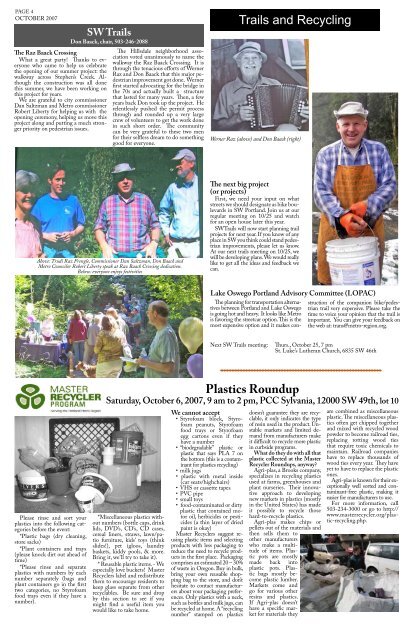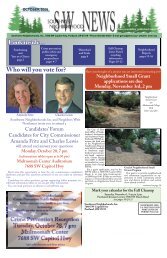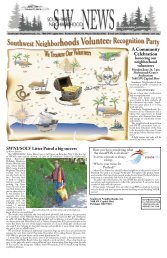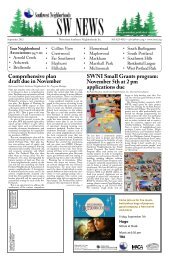October 2007.indd - Southwest Neighborhoods, Inc.
October 2007.indd - Southwest Neighborhoods, Inc.
October 2007.indd - Southwest Neighborhoods, Inc.
Create successful ePaper yourself
Turn your PDF publications into a flip-book with our unique Google optimized e-Paper software.
PAGE 4<br />
OCTOBER 2007 Trails and Recycling<br />
The Raz Baack Crossing<br />
What a great party! Thanks to everyone<br />
who came to help us celebrate<br />
the opening of our summer project: the<br />
walkway across Stephen’s Creek. Although<br />
the construction was all done<br />
this summer, we have been working on<br />
this project for years.<br />
We are grateful to city commissioner<br />
Dan Saltzman and Metro commissioner<br />
Robert Liberty for helping us with the<br />
opening ceremony, helping us move this<br />
project along and putting a much stronger<br />
priority on pedestrian issues.<br />
SW Trails<br />
Don Baack, chair, 503-246-2088<br />
Above: Trudi Raz Frengle, Commissioner Dan Saltzman, Don Baack and<br />
Metro Councilor Robert Liberty speak at Raz Baack Crossing dedication.<br />
Below: everyone enjoys festivities<br />
Please rinse and sort your<br />
plastics into the following categories<br />
before the event:<br />
*Plastic bags (dry cleaning,<br />
store sacks)<br />
*Plant containers and trays<br />
(please knock dirt out ahead of<br />
time)<br />
*Please rinse and separate<br />
plastics with numbers by each<br />
number separately (bags and<br />
plant containers go in the first<br />
two categories, no Styrofoam<br />
food trays even if they have a<br />
number).<br />
The Hillsdale neighborhood association<br />
voted unanimously to name the<br />
walkway the Raz Baack Crossing. It is<br />
through the tenacious efforts of Werner<br />
Raz and Don Baack that this major pedestrian<br />
improvement got done. Werner<br />
first started advocating for the bridge in<br />
the 70s and actually built a structure<br />
that lasted for many years. Then, a few<br />
years back Don took up the project. He<br />
relentlessly pushed the permit process<br />
through and rounded up a very large<br />
crew of volunteers to get the work done<br />
in such short order. The community<br />
can be very grateful to these two men<br />
for their selfless dream to do something<br />
good for everyone.<br />
*Miscellaneous plastics without<br />
numbers (bottle caps, drink<br />
lids, DVD’s, CD’s, CD cases,<br />
cereal liners, straws, lawn/patio<br />
furniture, kids’ toys (think<br />
slides!), pet igloos, laundry<br />
baskets, kiddy pools, & more.<br />
Bring it, we’ll try to take it).<br />
* Reusable plastic items. - We<br />
especially love buckets! Master<br />
Recyclers label and redistribute<br />
them to encourage residents to<br />
keep glass separate from other<br />
recyclables. Be sure and drop<br />
by this section to see if you<br />
might find a useful item you<br />
would like to take home.<br />
Werner Raz (above) and Don Baack (right)<br />
The next big project<br />
(or projects)<br />
First, we need your input on what<br />
streets we should designate as bike boulevards<br />
in SW Portland. Join us at our<br />
regular meeting on 10/25 and watch<br />
for an open house later this year.<br />
SWTrails will now start planning trail<br />
projects for next year. If you know of any<br />
place in SW you think could stand pedestrian<br />
improvements, please let us know.<br />
At our next trails meeting on 10/25, we<br />
will be developing plans. We would really<br />
like to get all the ideas and feedback we<br />
can.<br />
Lake Oswego Portland Advisory Committee (LOPAC)<br />
The planning for transportation alternatives<br />
between Portland and Lake Oswego<br />
is going hot and heavy. It looks like Metro<br />
is favoring the streetcar option. This is the<br />
most expensive option and it makes con-<br />
struction of the companion bike/pedestrian<br />
trail very expensive. Please take the<br />
time to voice your opinion that the trail is<br />
important. You can give your feedback on<br />
the web at: trans@metro-region.org.<br />
Next SW Trails meeting: Thurs., <strong>October</strong> 25, 7 pm<br />
St. Luke’s Lutheran Church, 6835 SW 46th<br />
Plastics Roundup<br />
Saturday, <strong>October</strong> 6, 2007, 9 am to 2 pm, PCC Sylvania, 12000 SW 49th, lot 10<br />
We cannot accept<br />
• Styrofoam block, Styrofoam<br />
peanuts, Styrofoam<br />
food trays or Styrofoam<br />
egg cartons even if they<br />
have a number<br />
• “biodegradable” plastic or<br />
plastic that says PLA 7 on<br />
the bottom (this is a contaminant<br />
for plastics recycling)<br />
• milk jugs<br />
• plastic with metal inside<br />
(car seats/highchairs)<br />
• VHS or cassette tapes<br />
• PVC pipe<br />
• small toys<br />
• food-contaminated or dirty<br />
plastic that contained motor<br />
oil, herbicides or pesticides<br />
(a thin layer of dried<br />
paint is okay)<br />
Master Recyclers suggest reusing<br />
plastic items and selecting<br />
products with less packaging to<br />
reduce the need to recycle products<br />
in the first place. Packaging<br />
comprises an estimated 20 – 30%<br />
of waste in Oregon. Buy in bulk,<br />
bring your own reusable shopping<br />
bag to the store, and don’t<br />
hesitate to contact manufacturers<br />
about your packaging preferences.<br />
Only plastics with a neck,<br />
such as bottles and milk jugs, can<br />
be recycled at home. A “recycling<br />
number” stamped on plastics<br />
doesn’t guarantee they are recyclable,<br />
it only indicates the type<br />
of resin used in the product. Unstable<br />
markets and limited demand<br />
from manufacturers make<br />
it difficult to recycle more plastic<br />
in curbside programs.<br />
What do they do with all that<br />
plastic collected at the Master<br />
Recycler Roundups, anyway?<br />
Agri-plas, a Brooks company,<br />
specializes in recycling plastics<br />
used at farms, greenhouses and<br />
plant nurseries. Their innovative<br />
approach to developing<br />
new markets in plastics (mostly<br />
in the United States) has made<br />
it possible to recycle those<br />
hard-to-recycle plastics.<br />
Agri-plas makes chips or<br />
pellets out of the materials and<br />
then sells them to<br />
other manufacturers<br />
who make a multitude<br />
of items. Plastic<br />
pots are mostly<br />
made back into<br />
plastic pots. Plastic<br />
bags mostly become<br />
plastic lumber.<br />
Markets come and<br />
go for various other<br />
resins and plastics.<br />
If Agri-plas doesn’t<br />
have a specific market<br />
for materials they<br />
are combined as miscellaneous<br />
plastic. The miscellaneous plastics<br />
often get chipped together<br />
and mixed with recycled wood<br />
powder to become railroad ties,<br />
replacing rotting wood ties<br />
that require toxic chemicals to<br />
maintain. Railroad companies<br />
have to replace thousands of<br />
wood ties every year. They have<br />
yet to have to replace the plastic<br />
ones.<br />
Agri-plas is known for their exceptionally<br />
well sorted and contaminant-free<br />
plastic, making it<br />
easier for manufacturers to use.<br />
For more information, call<br />
503-234-3000 or go to http://<br />
www.masterrecycler.org/plastic-recycling.php.






